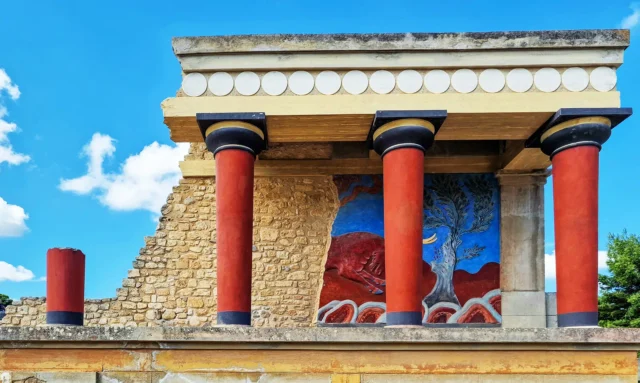
Archaeologist, War Hero, and Author
John Devitt Stringfellow Pendlebury (12 October 1904 – 22 May 1941) was a British archaeologist whose life and work became deeply intertwined with the island of Crete. He was not only a renowned scholar who made significant contributions to the understanding of Cretan archaeology but also a British intelligence officer who played a crucial role in the island’s resistance during World War II. His tragic death during the Battle of Crete marked the end of a remarkable life dedicated to both scholarship and service.
Early Life and Education
Born in London, Pendlebury’s fascination with archaeology began at a young age, fueled by a childhood visit to the British Museum. Despite losing an eye in an accident, he remained determined to pursue his passion and excelled academically. He won scholarships to prestigious institutions like Winchester College and Pembroke College, Cambridge, where he graduated with a First in Part II of the Classical Tripos, specializing in archaeology. In addition to his academic achievements, he also showcased his athletic abilities, competing internationally as a high jumper.
Archaeological Career: A Deep Connection with Crete
Pendlebury’s archaeological journey led him to Greece, where he developed a profound connection with the island of Crete. His early work focused on studying Egyptian artifacts found in the Aegean region, culminating in his publication “Catalogue of Egyptian Objects in the Aegean Area”. His passion for Crete led him to explore the island extensively, hiking its rugged terrain and immersing himself in its culture.
In 1930, Sir Arthur Evans, the renowned archaeologist who excavated Knossos, appointed Pendlebury as curator of the archaeological site. Pendlebury’s tenure at Knossos was marked by tireless efforts to restore and preserve the site. He meticulously managed its growing popularity, ensuring that the influx of visitors did not compromise the archaeological integrity of the palace complex. He also continued excavations, uncovering new insights into the Minoan civilization that once thrived there.
Pendlebury’s archaeological approach was notable for its early focus on environmental reconstruction, attempting to understand the impact of human activity on the Bronze Age landscape of Crete. His work at Knossos, for example, led him to hypothesize about overpopulation and deforestation in the region during that period. His deep understanding of Crete’s environment and its history would prove crucial in the years to come.
Beyond Knossos, Pendlebury’s archaeological pursuits extended across Crete. He directed excavations on Mount Dikti in eastern Crete and embarked on extensive explorations of the entire island, meticulously documenting its archaeological landscape. His intimate knowledge of Crete’s terrain, its people, and their dialects would later become a strategic asset during the war.
Pendlebury’s contributions to Cretan archaeology were not limited to fieldwork. He also published extensively, including “A Handbook to the Palace of Minos at Knossos with Its Dependencies” and “The Archaeology of Crete: An Introduction”. These works remain valuable resources for scholars and enthusiasts alike, a testament to his profound understanding of the island’s rich archaeological heritage.
War Service: Defending Crete
With the outbreak of World War II, Pendlebury’s deep connection with Crete and its people took on a new dimension. His expertise and local knowledge made him an invaluable asset to the British war effort. He was appointed British vice-consul at Heraklion (Candia), but his job title masked his true role as a key figure in organizing Cretan resistance against the impending German invasion.
Pendlebury leveraged his extensive network of contacts, cultivated during his archaeological expeditions, to mobilize the Cretan people. He established crucial relationships with influential kapetanios (clan chiefs), harnessing their leadership and the island’s fierce spirit of independence. He meticulously improved reconnaissance, identifying strategic routes, hiding places, and water sources that would later prove vital to the resistance.
During the German invasion of Crete in May 1941, Pendlebury actively participated in the defense of the island. He fought alongside Cretan partisans and British troops, utilizing his knowledge of the terrain to their advantage. However, the overwhelming German forces eventually prevailed, and Pendlebury was captured. Despite being wounded and under medical care, he was tragically executed. His untimely death shocked the archaeological community and remains a poignant reminder of the human cost of war.
Legacy
Pendlebury’s legacy is multifaceted. He is remembered not only as a pioneering archaeologist who made significant contributions to the understanding of Cretan history but also as a war hero who bravely fought for the island he loved. His life and work embody a unique blend of intellectual curiosity, adventurous spirit, and unwavering dedication to both scholarship and service.
He is buried in the Suda Bay War Cemetery, and his name is commemorated on war memorials in both Crete and England. His archaeological work continues to be studied, and his life serves as an inspiration to those who follow in his footsteps. His story is a testament to his unwavering passion for archaeology, his courage in adversity, and his ultimate sacrifice for his country and the people of Crete.
Key points
- Born: 12 October 1904, London, England
- Died: 22 May 1941, Heraklion, Crete, Kingdom of Greece
- Cause of death: Killed in action (execution by gunshot)
- Resting place: Souda Bay War Cemetery
- Nationality: British
- Legacy: Pioneering environmental archaeologist with a deep connection to Crete, British intelligence officer during World War II, author of several influential archaeological publications



